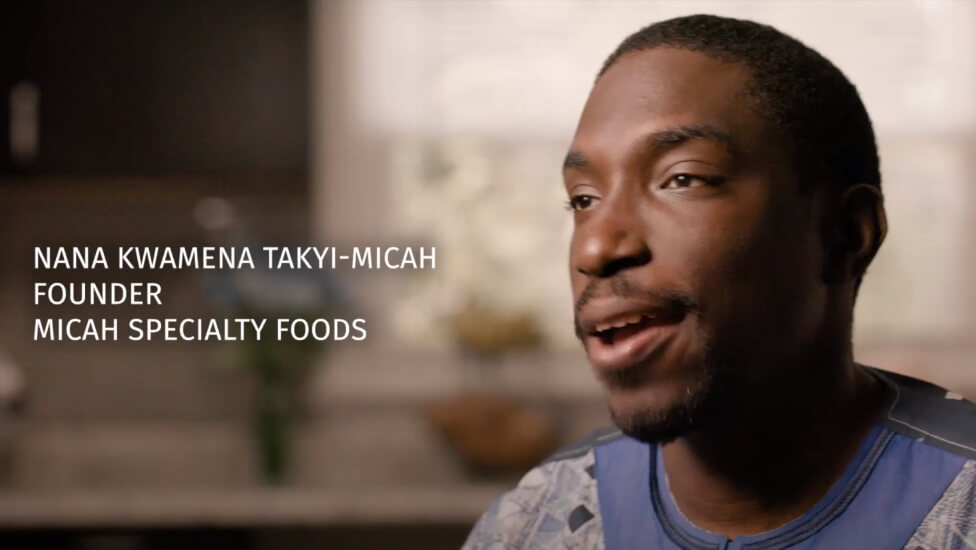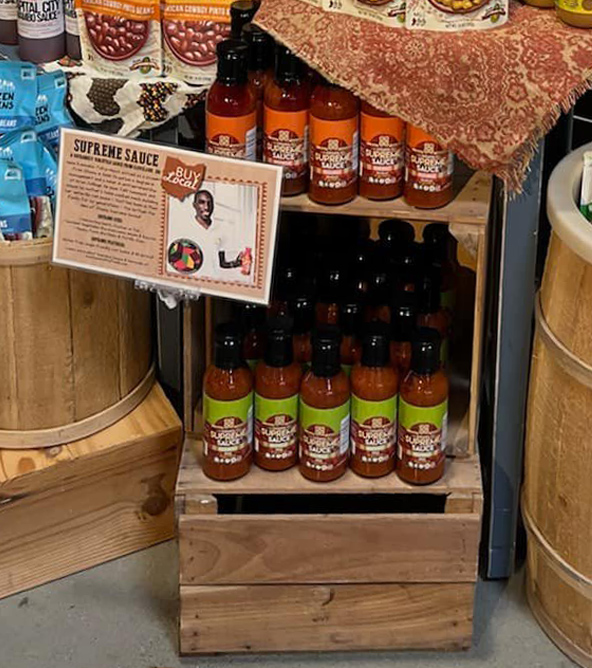Ghanaian entrepreneur finds recipe for success with food from his homeland
Specialty food startup promotes African food and fills a market gap

Key takeaways
- Find outside resources to support your business. Experienced partners and vendors can help you increase efficiency and achieve your goals. When you have expert support, it frees you up to focus on tasks that will grow your company.
- Be open to new sales and marketing channels. Look beyond your current channels to identify new opportunities to connect with and sell to your customers.
- Because rates for private loans are often higher, it’s wise to have students exhaust all federal loan options first.
- Make doing good part of your business strategy. Volunteering your time and money can help build your company’s profile and demonstrate that you are invested in improving your community. It may also have significant business benefits.

Small Business Community Champion Winner 2022: Micah Specialty Foods
Video
Growing up in Ghana, Nana Kwamena Takyi-Micah was inspired to become an entrepreneur by his father, an attorney who also operates a successful picture framing company. Takyi-Micah found his own business path by starting Cleveland-based Micah’s Specialty Foods, an African food products company that he hopes will raise visibility for African cuisine.
The company’s flagship product is Supreme Sauce, a marinade based on a recipe that has been in his family for six generations. Today, the company distributes 300 cases of sauce every month, has shelf space in 80 supermarkets and a thriving online sales business.
“I wanted to start a business that would increase representation of African culture and put it in a positive light by sharing our amazing food,” he says. “We’re determined to be a pioneer in this marketplace and make African food items more prominent and available.”
Micah’s Specialty Foods is a winner of a 2022 Citizens Small Business Community Champion Award, which recognizes entrepreneurs striving to improve their community. Read Takyi-Micah’s advice below on how to integrate community involvement into your business and how to use outside resources to fuel business success.
Tip: Find support so you can focus on growth
Takyi-Micah emigrated from Ghana to Ohio in 2010 to pursue a degree at Hiram College. As part of a class project, he pitched a specialty food business idea based on his family’s sauce in an entrepreneurial competition against 11 other fledgling companies.
“We didn’t win, and that motivated us to succeed,” he says. “If we had won, we may have just become complacent. Instead, it lit a fire in us to build the company we knew we wanted.”
Success for Takyi-Micah required him to find vendors and partners he could trust and rely on. In the early days he made small batches of sauce himself at the Cleveland Culinary Launch Kitchen, an incubator for startup food businesses. He quickly recognized that he needed an outside vendor to manufacture and package the sauce so that he could build his company. Finding a vendor who could make the sauce to his specifications was a turning point.
“Spending 20 to 30 hours a week in a commercial kitchen didn’t leave me with much time,” he says. “Once we had a manufacturer in place, not having to supervise the day-to-day production meant I could focus on other areas of the business.”
Takyi-Micah, who runs the business with his wife Natasha, says that securing their initial distributor was another important victory.
“Our first distributor got us into the Giant Eagle chain of supermarkets, where we sold out in the first month,” he says. “That opened a lot of doors for us.”
Bottom line: Look for partners and vendors to provide the expertise your business needs. For Micah’s, finding the right resources provided its founders with time to build their company.
In addition to outsourcing production, packaging and distribution to qualified vendors, the couple also secured outside help for tasks such as search engine optimization (SEO) and graphic design. Not just any help though. “Some consultants charge a high minimum fee for just a consultation, and a small business simply can’t afford that,” he notes. “To find collaborators who are the right fit, I’ve found it useful to lean on my personal network, such as an associate in Ghana who has helped us develop social media content.”
Tip: Be open to new sales and marketing channels
Pre-pandemic, the majority of Micah’s sales were wholesale to grocery stores. Company marketing tactics included social media and public relations efforts with local media and tasting events in stores. When COVID-19 restrictions put a halt to those efforts, Takyi-Micah shifted to outdoor farmers’ markets, where people could sample the product.
“Getting people to try the sauce and discover how good it tastes drives grocery store sales and helps keep our product on shelves,” he says. “By offering samples at farmers’ markets in a two- to three-mile radius of stores that sell our products, we can get people to try the product and direct them to buy at their local grocery store if they don’t buy that day.”
At the same time, the increased consumer interest in shopping online encouraged Takyi-Micah to improve the e-commerce experience on the company’s website and start selling on Amazon. Today, 20% of the company’s sales are from Amazon; 50% are wholesale to grocery stores such as Heinen’s, Acme, Market District and Dave’s Supermarket through distributors; and 30% from direct-to-consumer website sales and farmers’ markets.
Bottom line: Continually explore new sales and marketing channels to reach a wide range of customers. In addition to direct sales channels and marketing efforts, look for opportunities to raise company visibility. Social media, industry publications and coverage in local media can build your reputation and ultimately contribute to sales. Micah’s has been featured in several Cleveland area publications, blogs and news programs. “It’s basically free advertising,” he says. “It has been a great way to get our name out there.”
Tip: Seek creative ways to finance your business
It is rare that a business is an instant success. You may have to find sources of financing outside the company to maintain steady cash flow during the startup phase.
Takyi-Micah saved $10,000 to start Micah’s Specialty Foods by working three jobs on campus while still in college. The business started to take off, but in 2014 when he graduated, his student visa expired, and he had to return to Ghana. His then girlfriend and now wife Natasha kept the business running and once they were engaged, he returned to the U.S. on a fiancé visa. The couple jumpstarted the company in 2017, leaning on a line of credit (LOC) and business credit cards to “bootstrap” the business’s finances. Other sources of financing have included a loan from the Hebrew Free Loan Society and grants from entrepreneurial funding competitions including Acme Fresh Market’s Buckeye’s Best Contest and the National Science Foundation’s Innovation Corps (I-Corps) Plus competition.
While Takyi-Micah worked on the business full time initially, in 2018 he decided to take another full-time job as an insurance agent, to strengthen his family’s financial position as the company grew. While holding down a second job can be challenging, Takyi-Micah says it offers benefits beyond financial compensation.
“The sales experience has taught me to be better at closing sales and has helped me improve my negotiation skills for dealing with grocery store buyers and food distributors,” he says. “It has really helped me improve the communication skills that are so important to our company success.”
Bottom line: Consider all the potential options to finance your company, including business loans, a LOC, business credit cards and small business grants that may be available in your industry or local area. If you do need to work elsewhere until your company becomes established, try to find a position that gives you some knowledge to improve your own business.
Tip: Do good to do well
Community involvement can help build goodwill for your business and develop a two-way street for support. As part of its mission to give back to the community, Micah’s creates part-time jobs for formerly incarcerated individuals. The hope is that through working at the company, they will acquire skills they can use to attain a full-time position elsewhere, or even start their own food-related business.
“In the Buckeye-Shaker neighborhood of Cleveland where the business was first based, we met a lot of people in that position, who were unable to get hired elsewhere,” says Takyi-Micah. “Everyone deserves a second chance — after all, making a bad choice doesn’t make you a bad person, and we provide that opportunity.”
Giving previously incarcerated individuals an opportunity may have business benefits too. In addition to potentially acquiring valuable new team members, companies that do so may also qualify for a federal Work Opportunity Tax Credit.
Micah’s Specialty Foods also annually donates to nonprofits in Ghana that aid women and children. “We give back to Ghana, because Ghana is where our story began. It’s the heart of our company.”
Bottom line: Besides raising your company’s profile, giving back to the community demonstrates that you are invested in improving the lives of the people around you. While Takyi-Micah’s incentive for his community involvement was to help others, it has had business benefits. “We believe that making a contribution to the community is one of the most important things you can do as a business,” he explains. “The business benefit truly is secondary, but it is a wonderful by-product of our giving back, since our community has supported us as well.”
Related topics

Book publisher finds business success by supporting her community

Drone business finds a niche to finally reach its goals

2022 Small Business Community Champion Award winners
© Citizens Financial Group, Inc. All rights reserved. Citizens Bank, N.A. Member FDIC
Disclaimer: The information contained herein is for informational purposes only as a service to the public and is not legal advice or a substitute for legal counsel. You should do your own research and/or contact your own legal or tax advisor for assistance with questions you may have on the information contained herein.

